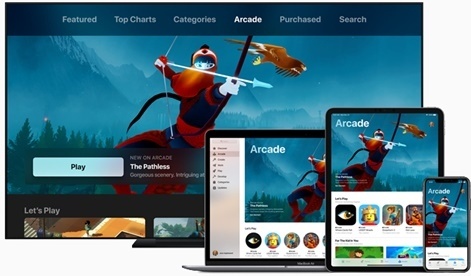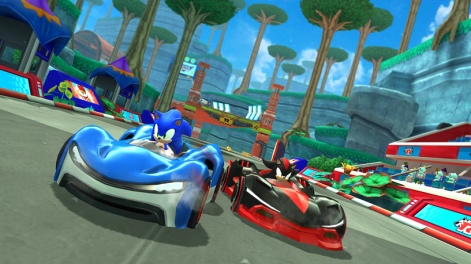This week Apple unveiled its new premium games subscription service called Apple Arcade that looks to shake up its own app store and services business.
Apple Arcade is set to feature over 100 new and exclusive games developed for the service, with the likes of Annapurna Interactive, Ustwo, Snowman, SEGA, Konami and more already signed up.
With the App Store currently possesses over 300,000 games and free-to-play games dominating, Apple is pitching the service as a place for premium-like games to thrive. But what might this new world entail for those left out to dry?
Whether this new structure is for better or for worse is something only time will tell. In the meantime to get a better analysis of this situation, we thought this would be the appropriate time to pose the question to our Indie Mavens for their ever-insightful thoughts.
What are your thoughts on Apple’s new game subscription service Apple Arcade, along with what you think it means for indie game developers going forward?
For us, it could be a game changer. We’ve been Mac game developers for two decades now since before we officially formed the company and iOS and Apple TV game developers since their respective App Stores opened.
Lately, we’ve been struggling simply because of lack of visibility and being unable to support writing any sort of longer-form game as we can’t get traction for any new paid games. Most of our dwindling income is still from Flick Fishing, which was one of the first games on the App Store and is the only game that’s on ALL of Apple’s platforms, iOS, macOS, tvOS and watchOS.
Even without Apple funding development, having an outlet where we can release a cross-platform game that we know will get decent visibility and reasonable income would let us sit down and put time into the games we want to write.
The issue for us is pretty much down to whether Adam and I can jump up and down waving our hands enough for Apple to notice us and want us on the service.
I think if you're selected as a developer for the platform, this is a slam-dunk on the dev side. The only real question is can the market successfully bear another subscription service for entertainment?
Since this is the first one for mobile, and Apple historically curates their lists pretty well, this will succeed. Hooray! Now if you'll excuse me, I’ve got to rip the ads out of all my designs and patch the holes to make 'em premium. That's quality, right?
One thing I’ve realised could be an issue since Apple put the developer link up is that Apple Arcade could be very difficult for smaller indies that don’t have independent income or some sort of venture funding for a project.

Because you’ve got to be able to show them as unreleased, Apple quality game that (ideally) is a fairly radical departure from the market norm, you’re potentially spending a lot of dev time and money on something that might not even make the cut and be impractical to monetise elsewhere. So smaller devs aren’t going to be able to afford the risk.
I'm necessarily sceptical about subscription-based services, given the historical effect on other art mediums.
However, I'm trying to stay optimistic about this one because the premium mobile market has already mostly bottomed out anyway and it looks like it might be great as a way to revive the family market if smaller, more polished experiences are easily able to be found.
I do not see how the Apple Arcade service is any different from other mobile subscription services, besides it having Apple’s backing. Granted, if anyone can make this concept work, a force like Apple can. However, I worry that being paid based on play-time will only further dilute the perceived value of mobile games in the eyes of players.
I worry that being paid based on play-time will only further dilute the perceived value of mobile games in the eyes of players.Molly Heady-Carroll
Furthermore, a platform where a developer is paid based on play-time is restrictive to specific gameplay styles. Short, linear experiences such as Florence could probably not be financially successful with such a business model, for example.
There is nothing inherent to the concept of the Apple App Store that makes it bias against premium games. It is a digital store that functions much the same as Steam, the Nintendo eShop, the PlayStation Store and so on, where developers have no problem selling premium games and making a living. The key difference is the way value is perceived on these platforms versus mobile game stores.
Premium, high-quality games could always and still can make it on mobile - The Room and Monument Valley series has proven this. There is nothing stopping the release of high-quality games made for mobile first with a premium price tag.
Yet developers have opted, in general, to create games that foster an environment where free, throwaway experiences are expected as a standard.
Mobile games suffer from an image problem. Perception of the App Store is dependent on the types of games developers choose to put on the platform and the types of games Apple chooses to highlight.
Mobile games developers need to create more substantial, less throwaway experiences and need to price their work seriously if we hope for the perception of mobile games to change.
Molly, I agree that the App Store does not bias against premium. When I look at the featuring choices on the App Store, I notice that premium games tend to get more featuring than the revenue they generate - if they did match revenue to featuring, then premium would only be five per cent of featuring. I think if anything, Apple has tried to fight the trend by supporting premium experiences with good featuring.
But how sure are you that the race to the bottom was driven by the developers, and not by consumers? My sense of it was that most indie developers were pretty hesitant to introduce ads and eventually IAPs into their games, (incorrectly) seeing it as selling out. Whereas consumers never had an issue downloading cheaper and cheaper games, eventually until the market had crowded out practically anything but free games.
Using The Room and Monument Valley as examples show how outdated the argument is as those games are from 2012 and 2014 respectively. Was there not a single good premium game since then, or did consumer behaviour change? In my opinion, it's definitely the latter.
As I said above, in my opinion, consumers were responsible for the ‘race to the bottom’, but that doesn't mean there's not some lingering demand. The biggest problem today for consumers wishing to find and pay for premium games is that those experiences are lost in a sea of cheap and free games, so it’s really hard to find them.

All the ads you see for mobile games are for free-to-play games, all the most effective social and viral experiences come from free-to-play games, and most people you know are playing free-to-play. It's really hard for premium to cut through the noise.
Would we all agree that there haven’t been any huge breakout premium hits in the last five years (excluding sequels)? If a group of experienced and successful mobile game developers haven't heard of any premium hits, then do they exist?
So, I would take a guess and say that Apple Arcade will revive a premium market on the App Store. A subscription like this removes a lot of friction for anyone wanting premium experiences.
Now they know exactly where to find those experiences, they can get them at a discounted subscription package rate and Apple is basically guaranteeing quality by keeping the pool of games limited.
In fact, there will be so many good games in there that you don't need to go looking elsewhere for new games, thus I could imagine some families only playing Apple Arcade games and blocking any further purchases on kids' devices.
Apple Arcade won't really dent free-to-play I don't imagine, it's too big and too successful to really notice. But Apple Arcade will carve out space where premium game developers can get paid to make awesome stuff, be creative and take chances. That's bloody perfect if you ask me.
Hey Simon, regarding your response to my opinion: there have definitely been premium games that have done very well on the App Store that are more recent.
To name a few: Florence, Hidden Folks, Donut County, Severed, the Rusty Lake series, Reigns... There absolutely are good premium mobile games that are supporting the developers financially.
Apple does a huge amount of promotion around the time of the awards. We won Mac Game of the Year 2018 for The Gardens Between and our revenue jumped 400 per cent on that platform.Simon Joslin
That's a great list. Clearly, there are still some great premium games coming out! Which is good news. However, I dug a bit deeper and I don't think it's so clear.
Florence is an Apple Design Award winner. That is a great way to mint money. So, I don't know if that's fair to include? Apple does a huge amount of promotion around the time of the awards. We won Mac Game of the Year 2018 for The Gardens Between and our revenue jumped 400 per cent on that platform.
Reigns, Hidden Folks, Donut County are all multi-platform releases on launch day. For me they're outside the scope of this discussion, at least I assume we're talking about the iOS exclusive premium market because that's where we started with the The Room and Monument Valley.
Severed I didn't know previously but I looked it up. It was a Vita game, then came to Wii U and iOS. So, I wouldn't count that either. Rusty Lakes is a series of games that are multi-platform releases. Again, I wouldn't count these.
I think it’s a really interesting discussion and important for our industry, but I don't feel convinced by that list.
I thought I’d throw my two cents into the discussion. At Nitrome we started out on mobile in premium with some success but as time went on felt that the returns didn’t really add up and like others went freemium in order to make things work.
Freemium did limit our creativity and titles we made became increasingly about how we could get the model to work over what we actually would ideally make. I don’t want to seem like we haven’t loved the games we have made, when something fits that model well like our game Leap Day it’s great.
When we started making our game Bomb Chicken though, we knew quickly that it stood no chance under the freemium model and at the same time we felt there wasn’t a market for it as a premium title to make the return we needed either.
In the end, we made the tough call to change the format and release on console instead. It worked out well but it was a huge learning curve to go to such a different platform.
Personally, I’m thrilled Apple is doing this. In the early days of the App Store developers were exploring really interesting things that you could do on mobile with the touch screen and accelerometers making games and exploring art styles that didn’t fit the mould of typical console gaming.
Free-to-play killed off a lot of that and I hope that Apple Arcade gives developers back the freedom to explore this again.

Having said that, making this work for Apple I believe will require a lot of curation which may make it hard for smaller indies to get in the door.
While that’s not ideal having a free for all would just lead to all the same problems as we have in the current set up and Apple have proven in the editorial section of the App Store to be fairly relatable at recognising titles of merit.
One final thought about the impending rise of the subscription-based all you can eat models that seem to be getting announced is a concern about exclusives. Apple has pushed that a lot of these games will be exclusive and that makes sense.
Netflix would not be where it is today without the exclusive titles to drive new users onto the platform. It’s not always the best thing for the developer though as he is pressured to forgo revenue from other platforms which creates risk and it’s not good for consumers who feel locked out from titles they would otherwise have loved to play.
The launch of Apple Arcade and other subscription/streaming services coming to PC and console in the next few years, in my opinion, should have a positive effect on the quality of content that players consume.
Once they sign up to the subscription service, consumers are much more likely to try genres they wouldn't have otherwise tried and it pushes the user acquisition as well as the retention problem over to the platform-holder instead of to the individual games.
I'm excited to see how subscriptions are going to disrupt the industry and I am feeling generally positive about it.Daniel Menard
This means that more creative, interesting experiences can survive on the service and the overall quality of the content should go up. There won't be the creative limitations imposed by monetisation and business model. We see this with Netflix and how it produces its own shows.
It does really come down to the business model though. I see a lot of streaming services adopting a ‘pay for minutes’ model for compensating devs, and I actually think this is entirely counter-productive. It heavily favours games with strong retention hooks to keep players in the game and engaged, and those hooks tend to exist mostly in freemium titles.
There also isn't a measure for the quality of those play minutes. Monument Valley is short but the player minutes are valuable and high quality. Candy Crush is long, but are the play minutes as good?
In order for these subscription services to really differentiate, I think they need a ton of high-quality, premium content and the best way to produce that content is to have the service assume the cost of development and essentially buy-out developers.
As far as I know, this is what Netflix does for its original content. This doesn't bias the experiences toward high-retention games and keeps the quality and variety of the content high, which makes the subscription service more valuable for consumers and keeps them paying.
Adopting that business model requires a lot of capital, and we all know Apple has the cash to do it, so I hope that is the model they are adopting with Apple Arcade. If it is, that means security for talented studios and better experiences for players.
The only downside with all this is we return to the era of gatekeepers, and the audience for each of these subscription services will be tightly controlled, and the number of games on the platform limited. We're hoping that Double Stallion will make the cut.
I'm excited to see how subscriptions are going to disrupt the industry and I am feeling generally positive about it. This is a natural move for developers of premium games and gets around the moral/legal grey area that some freemium titles live in, for example with loot boxes becoming regulated in some territories.




























